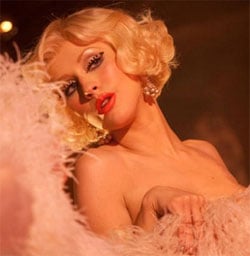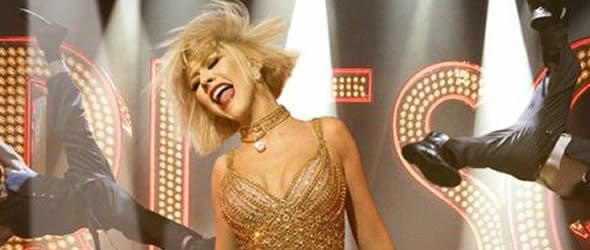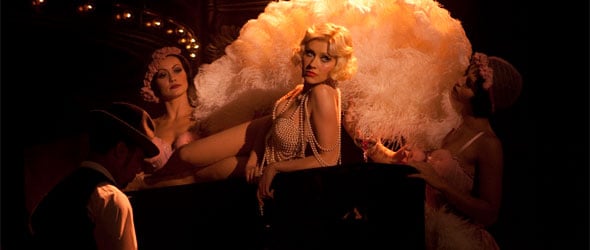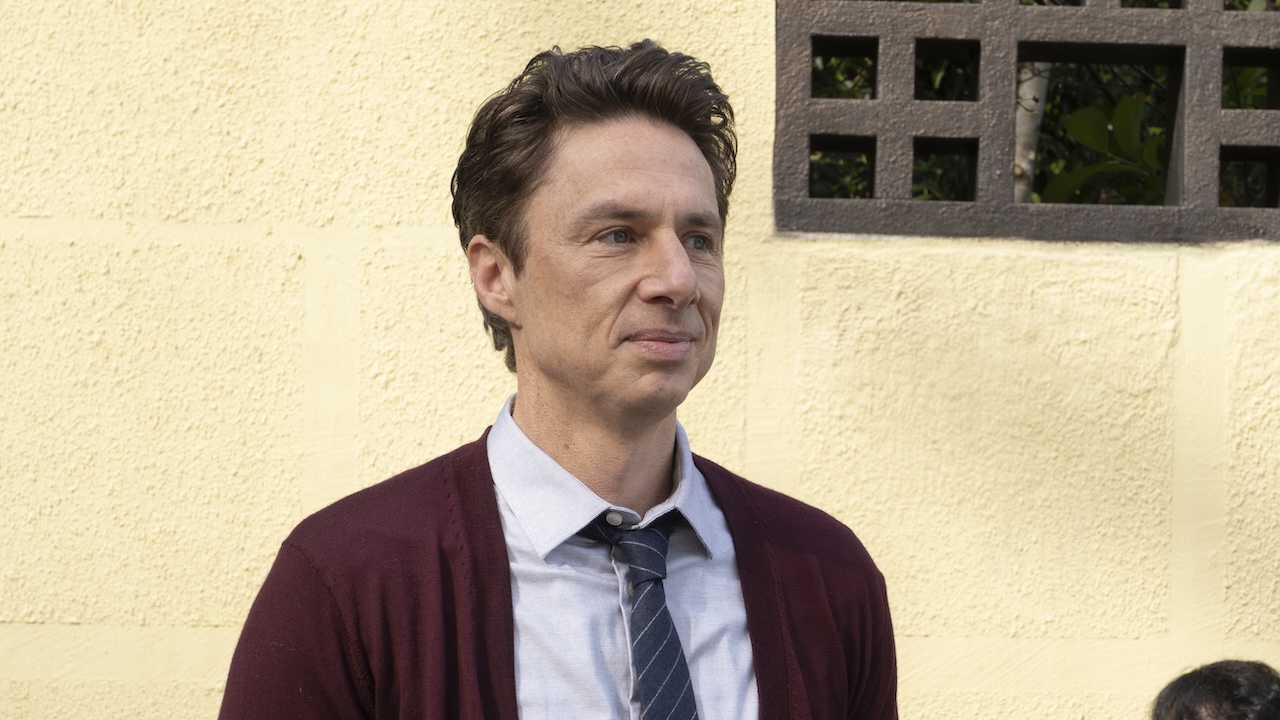Interview: Burlesque's Christina Aguilera

Your Daily Blend of Entertainment News
You are now subscribed
Your newsletter sign-up was successful
Eleven years ago, Christina Aguilera exploded on to the popular music scene with the song “Genie In A Bottle.” Part of a wave of young, blonde singers, she set herself apart with her incredible vocal stylings and range. While most of her cohorts, from Britney Spears to Jessica Simpson, jumped into the movie world quickly with films like Crossroads and The Dukes of Hazzard, Aguilera took her time, carefully selecting what her breakout role would be. Finally, she chose Burlesque.
Speaking with the young singer/actress during a roundtable interview, she discussed what it was like making her first film, from her interactions with the legendary Cher to the mindset she entered while writing the songs sung by her character in the film. Check out my interview below.
Was it a bit intimidating having to tell off Cher in a couple scenes in the film and how did you handle your interactions the first time you met her?
It was hard. It was intimidating. We shot that scene a little while later. So we were able to warm up to each other and build a strong bond and connection with one another. So by then we were comfortable. She was great, though, because she is just as good if not better for her off camera moments when she’s delivering you lines, because she really pushes the other person’s buttons to make them react and push them to be even better than the dialogue calls for because there were moments where she’s trying to help me get angry. She’s like, “What do you want, bitch!” Then I’m like “[gibberish]!” You know what I mean?
And I’ll really lay into her and she makes it really easier for the other person. And I had another scene, the audition scene where she walks away from me, and I’m like, “I’m talking to you, bitch!” We were very much in support of pushing each other’s buttons in order to get each other to be better for the movie. I learned that from her. So that’s partly how she got me warmed up to screaming at her [laughs].
Beyond Cher, this movie is top heavy with talent. What did you learn from the other actors?
I grew leaps and bounds on this movie. Not only because of the many hats that I had to wear, this was normal movie to shoot because I had to write music for the film, I had to then go and record the music, portray it from Ali’s point of view, which is actually a whole different thing then actually recording music that comes from me. And then having to go into intense dance rehearsals and focus purely on that. Then to dive head first vulnerably and emotionally into the acting involved, it was so much, but the cast of characters definitely helped get you into the world and into the environment – watching people’s process, how they work, helping each other get to a certain emotional point in a scene. Cher was absolutely incredible – someone that’s been there, done it a thousand times before you. What a better person to learn from. Stanley Tucci, Kristen Bell was a riot; Cam Gigandet, the scenes we shared definitely had to be a little awkward at times considering his cookie box and things like that.
Your Daily Blend of Entertainment News
How did the creative process work writing songs for the movie? Did you write the songs with the script in hand?
Yes I did. I went in approaching the writing to the songs by, first of all, getting Steven [Antin] to write me bullet points of what he wants to songs to portray, what he wants the audience to leave with the message of the moment, how Ali’s feeling. Then I would cut to looking at the script and what the scene calls for itself, getting in the moment of how Ali would feel and then I went to work writing the songs. So it was all about Ali and not me.

Did you visit a lot of burlesque places for preparation?
Well, part of the reason why I signed on was because I have a collection of burlesque books at home. I’ve collected them for years, I’ve been to shows and it’s always been a fascination and a love for me. I’ve always been intrigued by the idea of burlesque. I’ve been but prior to even knowing about or doing the movie.
Can you talk a little bit about the power and the feminism that comes with burlesque dancing?
Absolutely. I think in any case throughout the history of men and women in general and the issue of sensuality or sexuality there’s been so many double standards. There’s been many opinions in general about it as a topic. I could go on and on about this subject and the unfairness of it all, but that’s why I like to, throughout my own creative process and the songs that I’ve put out and the videos that I make and then signing on to this project, any way that I can express myself in ways that will empower women to fell comfortable in their own skin, to feel comfortable in their own bodies – to get on a stage and exude such amazing charisma and energy and feeling good about yourself then I’m all up for it.
And I knew going into this movie that that’s what burlesque means to me. I think it’s extremely empowering for a women to feel confident within her own body, within her own skin and to not be afraid of being fearless about that. I think that there are a lot of double standards, people can judge, but at the end of the day this is a movement and it’s a powerful expression and it’s a way that women can empower themselves and feel good.
Why do you think burlesque dancing has come back into fashion in recent years?
I think that it’s an undeniable art form. I think that it’s something everyone can be intrigued by if spun in a different light. When I first was given the script I thought it would be a period, given that the title was Burlesque, but in actuality it was set in modern times, so I feel like this movie gives you a fresh taste and a new outlook on what burlesque can mean nowadays.

If this were a period piece, how do you think it would be different?
Well, it would have been set at a different time [laughs]. The clothing would have been different; Ali wouldn’t have had headphones in, dancing in the streets [laughs]. I think the normal things. But I would have done it if it was a period piece. I love old movies and things set back in other times.
How long have you been considering a film career?
It’s been something that I’ve been wanting to do for a long time, but the right script hadn’t come along and I wasn’t going to ever rush into anything and do the transition that a lot of people do just to do a movie and just to say they did it. I wasn’t interested in that. I wanted to really do something. If I was going to do something I wanted to do acting right and I wanted to really believe in something and believe in a role and believe in the movie and feel passionate about it.
Did you always want to do a musical or something else entirely?
I did think that there’s no way I want my first film to be a musical. I like a challenge. I wanted something I could sink my teeth into. If I was going to act, I was going to act; I wasn’t just going to portray another side of myself. But this one came with everything. It definitely came as a loaded package and I’ve never worked so hard in my life. I know every couple of weeks they had to keep taking in my clothes just because the work schedule alone, I was working 17-18 hour days, jumping from dance rehearsals to writing, recording and acting. It was just exhausting. But, anyway, back to your question, I did at first but this one spoke to me. The fact that it was about burlesque and not just a singing piece – a specific vision and the underground world that burlesque is, and beauty and magic and wonderment just really spoke to me.
Did you look at movie musicals in the same vein as Burlesque in preparation?
Cabaret was definitely a referencing point. There were a few dance moves that Steven really wanted to take from Cabaret and sort of pay tribute to them in the movie. I don’t think a couple of them made the movie, but…[laughs]. But Fosse, Cabaret… I actually looked at Wizard of Oz, actually, because she’s so wide eyed.

Eric Eisenberg is the Assistant Managing Editor at CinemaBlend. After graduating Boston University and earning a bachelor’s degree in journalism, he took a part-time job as a staff writer for CinemaBlend, and after six months was offered the opportunity to move to Los Angeles and take on a newly created West Coast Editor position. Over a decade later, he's continuing to advance his interests and expertise. In addition to conducting filmmaker interviews and contributing to the news and feature content of the site, Eric also oversees the Movie Reviews section, writes the the weekend box office report (published Sundays), and is the site's resident Stephen King expert. He has two King-related columns.
